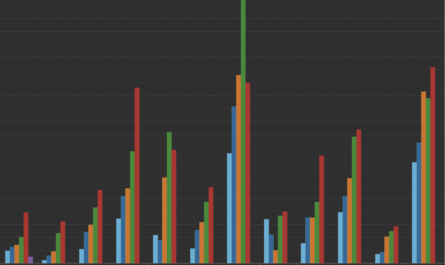The second year in office of the coalition government was not an easy one for the SPD, FDP and Greens. Politicians once again had to deal with numerous crises or mitigate them for the citizens of this country without putting their own national budget and the economy under pressure. In fact, the federal budget was even unconstitutional and had to be completely renegotiated in December. Despite further cost-cutting measures, the debt brake was once again suspended, paving the way for further currency devaluation and making the younger generation in particular swallow the next pill with regard to the intergenerational contract.
The compromises reached within the coalition were certainly not easy and gave rise to heated debates. Both the left, green and liberal sides had to make constant compromises in order to reach a solution that could command a majority, which is likely to have often annoyed their own voters. Their own ideas and approaches had to be elaborated with even better arguments in order to be implemented. In the end, the solutions are likely to have been the best for all sides – after all, the more heated the debate, the better the result in the end.
In fact, a lot will change for us investors this year. In this article, we want to summarize the most important changes for 2024 for our readers.
More net from gross
Probably the most important change for 2024: even without a salary adjustment by the employer, employees will have more money in their pockets from the January salary. The reason for this is a further increase in the basic tax-free allowance and therefore the amount from which income tax must be paid. For singles, this will rise by 876 euros to 11,784 euros, which is more than in the previous year and, above all, more than originally planned. This means that married couples and registered partners will only have to pay tax from an annual salary of EUR 21,816. The increase also raises the amount from which the top tax rate (42%) applies. This will apply to single earners from 66,761 euros instead of the previous 62,810 euros.
Higher pensions
Pensioners may also receive more money this year. According to the German government’s draft pension insurance report, old-age pensions are set to rise by 3.5% nationwide from July 2024, the same rate as in the West, with an increase of 4.2% in the East. However, the final decision will not be made until the final data on wage trends is available. Contributors will pay a stable rate of 18.6% into the pension fund.
The planned generational capital, which will be a slimmed-down equity pension, will finally be implemented as a first step in the course of the year in order to ensure stable contribution rates for the coming years. However, this is unlikely to guarantee a better pension rate.
Higher minimum wage
The statutory minimum wage will also be increased in 2024. From January 1, 2024, this will rise from 12 euros per hour to 12.41 euros, meaning that low earners will benefit twice over from the higher exemption limits. For apprenticeships, the monthly remuneration must be at least 649 euros in the first year of training and 909 euros in the fourth year.
In addition, the monthly earnings limit for mini-jobbers will rise from €520 to €538, which shifts the earnings limit to €6,456 per year. Pensioners, pupils, students or employees who want to earn extra money through a midi-job can continue to earn up to €2,000 at a reduced rate from January 1, 2024. Up to this income, employees only pay very low social security contributions. This will make additional income opportunities more attractive.
Higher citizens’ income
From January 2024, anyone who is dependent on Citizen’s Income will receive an increase – and not a small one at that. Since January 1, 2024, single and single-parent adults of full age without a job will receive 563 euros per month in standard needs level I, which is 57 euros, or 12%, more than before. This sum can be used for daily expenses such as food, toiletries or a visit to the hairdresser, while the job center also covers the cost of rent and heating. In the meantime, the office has set an appropriate apartment size for this, which caps these costs. In future, adults living together will receive 506 euros (+55 euros) and young people aged 14 to 17 471 euros (+51 euros) per month. Children aged 6 to 14 will receive 390 euros (+42) and children up to the age of 6 will receive 357 euros (+39 euros).
Due to the significant increase, there were calls that work would no longer be worthwhile compared to simply receiving the Citizen’s Income. We had already devoted an extensive article to this accusation in September.
Health insurance often becomes more expensive
As at the turn of the year to 2023, many statutory health insurance funds have increased their supplementary contribution, which may ultimately be reflected in your payslip and therefore your net salary. On average, the additional contributions will rise to 1.7% of gross income. As the additional contribution is set by each health insurance fund itself, it does not increase for every fund. Health insurance funds such as Techniker Krankenkasse are not increasing their prices for the second year in a row.
In addition, the income threshold for contributions is rising from 4,987 to 5,175 euros. High earners will also pay more contributions for statutory pension insurance. Here, the assessment threshold is rising to 7,300 euros in the west and 7,550 euros in the east.
Miscellaneous
Furthermore, the sales tax in the catering sector will be rolled back to its pre-coronavirus pandemic level, rising from 7% to 19%. The subsidy for electric vehicles expired in December and was originally intended to run beyond the end of the year. Otherwise, the Heating Act will be introduced in a softened form, the CO2 price will rise and the hurdles for balcony power plants will be lowered. Investors in cryptocurrencies can look forward to a higher exemption limit for private sales transactions, which will be raised from 600 to 1,000 euros.
Among other things, the controversial gas and electricity price brakes and some subsidies for agriculture will be abolished. This could therefore lead to further price increases.







